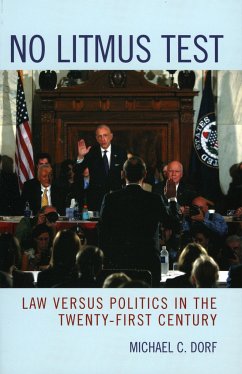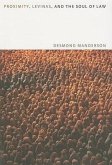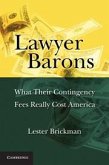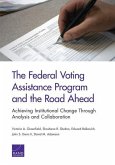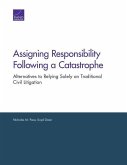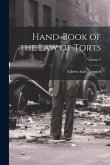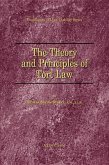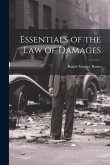- Broschiertes Buch
- Merkliste
- Auf die Merkliste
- Bewerten Bewerten
- Teilen
- Produkt teilen
- Produkterinnerung
- Produkterinnerung
The courts and, indeed, the law itself are under assault from both right and left. By analyzing the most pressing controversies of our day, No Litmus Test defends the possibility of principled legal decision-making against the attacks of both the right and the left. From Bush v. Gore to the war in Iraq, No Litmus Test demonstrates that even when the law provides no clear-cut right answers, it offers tools for distinguishing good arguments from bad ones.
Andere Kunden interessierten sich auch für
![Proximity, Levinas, and the Soul of Law Proximity, Levinas, and the Soul of Law]() Desmond MandersonProximity, Levinas, and the Soul of Law36,99 €
Desmond MandersonProximity, Levinas, and the Soul of Law36,99 €![Lawyer Barons Lawyer Barons]() Lester BrickmanLawyer Barons46,99 €
Lester BrickmanLawyer Barons46,99 €![The Federal Voting Assistance Program and the Road Ahead The Federal Voting Assistance Program and the Road Ahead]() Victoria A GreenfieldThe Federal Voting Assistance Program and the Road Ahead34,99 €
Victoria A GreenfieldThe Federal Voting Assistance Program and the Road Ahead34,99 €![Assigning Responsibility Following a Catastrophe Assigning Responsibility Following a Catastrophe]() Nicholas M PaceAssigning Responsibility Following a Catastrophe59,99 €
Nicholas M PaceAssigning Responsibility Following a Catastrophe59,99 €![Hand-Book of the Law of Torts; Volume 2 Hand-Book of the Law of Torts; Volume 2]() Edwin Ames JaggardHand-Book of the Law of Torts; Volume 233,99 €
Edwin Ames JaggardHand-Book of the Law of Torts; Volume 233,99 €![The Theory and Principles of Tort Law The Theory and Principles of Tort Law]() Thomas A. StreetThe Theory and Principles of Tort Law35,99 €
Thomas A. StreetThe Theory and Principles of Tort Law35,99 €![Essentials of the Law of Damages Essentials of the Law of Damages]() Ralph Stanley BauerEssentials of the Law of Damages30,99 €
Ralph Stanley BauerEssentials of the Law of Damages30,99 €-
-
-
The courts and, indeed, the law itself are under assault from both right and left. By analyzing the most pressing controversies of our day, No Litmus Test defends the possibility of principled legal decision-making against the attacks of both the right and the left. From Bush v. Gore to the war in Iraq, No Litmus Test demonstrates that even when the law provides no clear-cut right answers, it offers tools for distinguishing good arguments from bad ones.
Hinweis: Dieser Artikel kann nur an eine deutsche Lieferadresse ausgeliefert werden.
Hinweis: Dieser Artikel kann nur an eine deutsche Lieferadresse ausgeliefert werden.
Produktdetails
- Produktdetails
- Verlag: Globe Pequot Publishing Group Inc/Bloomsbury
- Seitenzahl: 320
- Erscheinungstermin: 9. März 2006
- Englisch
- Abmessung: 228mm x 154mm x 20mm
- Gewicht: 503g
- ISBN-13: 9780742550308
- ISBN-10: 0742550303
- Artikelnr.: 21106489
- Herstellerkennzeichnung
- Libri GmbH
- Europaallee 1
- 36244 Bad Hersfeld
- gpsr@libri.de
- Verlag: Globe Pequot Publishing Group Inc/Bloomsbury
- Seitenzahl: 320
- Erscheinungstermin: 9. März 2006
- Englisch
- Abmessung: 228mm x 154mm x 20mm
- Gewicht: 503g
- ISBN-13: 9780742550308
- ISBN-10: 0742550303
- Artikelnr.: 21106489
- Herstellerkennzeichnung
- Libri GmbH
- Europaallee 1
- 36244 Bad Hersfeld
- gpsr@libri.de
Michael C. Dorf is the Michael I. Sovern Professor of Law at Columbia University School of Law. He is the editor of Constitutional Law Stories (2004) and coauthor, with Laurence H. Tribe, of On Reading the Constitution (1991). He clerked for U.S. Supreme Court Justice Anthony M. Kennedy (1991-1992) and Judge Stephen Reinhardt of U.S. Court of Appeals for the Ninth Circuit (1990-1991).
Chapter 1 Acknowledgements Chapter 2 About the Author Chapter 3
Introduction Part 4 I. The Difference Between Law and Politics Chapter 5 1.
They Are All Activists Now Chapter 6 2. Is There a Distinction Between Law
and Politics? Yes, and the Bush v. Gore Decision Proves It Chapter 7 3.
Clarence Thomas's Challenge to the Rehnquist Court's Vision of
Representative Government Chapter 8 4. Does Federal Tort Law Reform Unduly
Infringe State Sovereignty? Part 9 II. Aid and Comfort to the Enemy Chapter
10 5. The Supreme Court Case That Pits Free Speech Against Church-State
Separation Chapter 11 6. How Abortion Politics Impedes Clear Thinking on
Other Issues Involving Fetuses Chapter 12 Why the Lawsuit Challenging
Tennessee's "Choose Life" License Places Should Fail Chapter 13 Three Bad
Reasons - and One Very Good Reason - to Oppose a Constitutional Amendment
Barring Same-Sex Marriage Chapter 14 A Federal Appeals Court Rules That
Universities Can Bar Military Recruiters Without Losing Federal Grant
Money: A Welcome Result Based on Flawed Reasoning Chapter 15 10. Justice
Scalia's Persuasive but Elitist Response to the Duck Hunting Controversy
Chapter 16 11. Can a State Make It a Crime to Refuse to Identify Yourself
to the Police? In a Narrow Ruling, the Supreme Court Says Yes Chapter 17
12. Why "Swift Boat Veterans for Truth" and other "527" Organizations Can't
Be Silenced Chapter 18 13. Does the Constitution Permit the Blue States to
Secede? With Permission, Perhaps; Unilaterally, No Chapter 19 14. How the
Schiavo Federal Court Case Might Have Been Won Part 20 III. In Defense of
Liberal Judging Chapter 21 15. Washington Yankees in King Arthur's Court:
The Supreme Court Journeys to 18th Century England to Define the Rights of
21st Century Americans Chapter 22 16. How a Recent Supreme Court Public
Housing Decision "Exiles Compassion from the Province of Judging" Chapter
23 17. Could Justice Scalia's Affirmative Action Dissent Become
Self-Fulfilling Prophecy? Chapter 24 18. Is There a Constitutional Right to
Sexual Privacy? Finding None, a Federal Appeals Court Upholds Alabama's Sex
Toy Prohibition Part 25 IV. Liberty, Security, and War Chapter 26 19. What
is an "Unlawful Combatant," and Why It Matters: The Status of Detained al
Qaeda and Taliban Fighters Chapter 27 20. The Justice Department's Change
of Heart Regarding Torture: A Fair-Minded and Praiseworthy Analysis That
Could Have Gone Still Further Chapter 28 21. Who Decides Whether Yaser
Hamdi, or Any Other Citizen, Is an Enemy Combatant? Chapter 29 22. Bush
Loses in the Supreme Court and America Wins Chapter 30 23. Is Iraq in
"Material Breach" of its Obligations under the U.N. Resolution? A
Geopolitical Question, Not Simply a Legal One Chapter 31 24. Is the War on
Iraq Lawful? Chapter 32 25. Why Congressional Power to Declare War Does Not
Provide an Effective Check on the President Chapter 33 26. Kerry Stands By
His Iraq Vote, and with Bush, Against Constitutional Principles Part 34 V.
The Global Village Chapter 35 27. When American States Execute Citizens of
Foreign Countries: The Case of Gerardo Valdez Chapter 36 28. Can One
National Arrest the Foreign Minister of Another? The World Court Says No
Chapter 37 29. Should Foreigners Be Permitted to Make Campaign
Contributions to U.S. Candidates? Surprisingly, the Answer May Be Yes
Chapter 38 30. The Hidden International Influence in the Supreme Court
Decision Barring Executions of the Mentally Retarded Chapter 39 31. The Use
of Foreign Law in American Constitutional Interpretation: A Revealing
Colloquy Between Justices Scalia and Breyer Chapter 40 32. Can Ethnic
Hatred Be Eliminated by Eliminating Ethnicity? The Rwanda Experiment
Chapter 41 33. What a Chinese Height Discrimination Case Says About Chinese
(and American) Constitutional Law Part 42 The Rule of Law(yers) Chapter 43
34. Debate over an ABA Legal Ethics Rule Underscores Lawyers' Competing
Obligations to Keep Secret and to Disclose Chapter 44 35. Can the Legal
Profession Improve its Image? Americans Believe Lawyers to Be Necessary but
Dishonest, Survey Finds Chapter 45 36. Americans' Faith in the Supreme
Court - And in the Constitution: Survey Shows Bush v. Gore's Effect was
Limited Chapter 46 37. Whose Constitution Is it Anyway? What Americans
Don't Know About the Constitution - And Why It Matters Chapter 47 38.
Unsolicited Advice to Law School Applicants: With Prospects Newly Limited,
Be Sure You Want to Become a Lawyer Chapter 48 39. How to "Think Like a
Lawyer": Advice to New and Prospective Law Students Chapter 49 Appendix
Chapter 50 Bibliographical Note Chapter 51 Index
Introduction Part 4 I. The Difference Between Law and Politics Chapter 5 1.
They Are All Activists Now Chapter 6 2. Is There a Distinction Between Law
and Politics? Yes, and the Bush v. Gore Decision Proves It Chapter 7 3.
Clarence Thomas's Challenge to the Rehnquist Court's Vision of
Representative Government Chapter 8 4. Does Federal Tort Law Reform Unduly
Infringe State Sovereignty? Part 9 II. Aid and Comfort to the Enemy Chapter
10 5. The Supreme Court Case That Pits Free Speech Against Church-State
Separation Chapter 11 6. How Abortion Politics Impedes Clear Thinking on
Other Issues Involving Fetuses Chapter 12 Why the Lawsuit Challenging
Tennessee's "Choose Life" License Places Should Fail Chapter 13 Three Bad
Reasons - and One Very Good Reason - to Oppose a Constitutional Amendment
Barring Same-Sex Marriage Chapter 14 A Federal Appeals Court Rules That
Universities Can Bar Military Recruiters Without Losing Federal Grant
Money: A Welcome Result Based on Flawed Reasoning Chapter 15 10. Justice
Scalia's Persuasive but Elitist Response to the Duck Hunting Controversy
Chapter 16 11. Can a State Make It a Crime to Refuse to Identify Yourself
to the Police? In a Narrow Ruling, the Supreme Court Says Yes Chapter 17
12. Why "Swift Boat Veterans for Truth" and other "527" Organizations Can't
Be Silenced Chapter 18 13. Does the Constitution Permit the Blue States to
Secede? With Permission, Perhaps; Unilaterally, No Chapter 19 14. How the
Schiavo Federal Court Case Might Have Been Won Part 20 III. In Defense of
Liberal Judging Chapter 21 15. Washington Yankees in King Arthur's Court:
The Supreme Court Journeys to 18th Century England to Define the Rights of
21st Century Americans Chapter 22 16. How a Recent Supreme Court Public
Housing Decision "Exiles Compassion from the Province of Judging" Chapter
23 17. Could Justice Scalia's Affirmative Action Dissent Become
Self-Fulfilling Prophecy? Chapter 24 18. Is There a Constitutional Right to
Sexual Privacy? Finding None, a Federal Appeals Court Upholds Alabama's Sex
Toy Prohibition Part 25 IV. Liberty, Security, and War Chapter 26 19. What
is an "Unlawful Combatant," and Why It Matters: The Status of Detained al
Qaeda and Taliban Fighters Chapter 27 20. The Justice Department's Change
of Heart Regarding Torture: A Fair-Minded and Praiseworthy Analysis That
Could Have Gone Still Further Chapter 28 21. Who Decides Whether Yaser
Hamdi, or Any Other Citizen, Is an Enemy Combatant? Chapter 29 22. Bush
Loses in the Supreme Court and America Wins Chapter 30 23. Is Iraq in
"Material Breach" of its Obligations under the U.N. Resolution? A
Geopolitical Question, Not Simply a Legal One Chapter 31 24. Is the War on
Iraq Lawful? Chapter 32 25. Why Congressional Power to Declare War Does Not
Provide an Effective Check on the President Chapter 33 26. Kerry Stands By
His Iraq Vote, and with Bush, Against Constitutional Principles Part 34 V.
The Global Village Chapter 35 27. When American States Execute Citizens of
Foreign Countries: The Case of Gerardo Valdez Chapter 36 28. Can One
National Arrest the Foreign Minister of Another? The World Court Says No
Chapter 37 29. Should Foreigners Be Permitted to Make Campaign
Contributions to U.S. Candidates? Surprisingly, the Answer May Be Yes
Chapter 38 30. The Hidden International Influence in the Supreme Court
Decision Barring Executions of the Mentally Retarded Chapter 39 31. The Use
of Foreign Law in American Constitutional Interpretation: A Revealing
Colloquy Between Justices Scalia and Breyer Chapter 40 32. Can Ethnic
Hatred Be Eliminated by Eliminating Ethnicity? The Rwanda Experiment
Chapter 41 33. What a Chinese Height Discrimination Case Says About Chinese
(and American) Constitutional Law Part 42 The Rule of Law(yers) Chapter 43
34. Debate over an ABA Legal Ethics Rule Underscores Lawyers' Competing
Obligations to Keep Secret and to Disclose Chapter 44 35. Can the Legal
Profession Improve its Image? Americans Believe Lawyers to Be Necessary but
Dishonest, Survey Finds Chapter 45 36. Americans' Faith in the Supreme
Court - And in the Constitution: Survey Shows Bush v. Gore's Effect was
Limited Chapter 46 37. Whose Constitution Is it Anyway? What Americans
Don't Know About the Constitution - And Why It Matters Chapter 47 38.
Unsolicited Advice to Law School Applicants: With Prospects Newly Limited,
Be Sure You Want to Become a Lawyer Chapter 48 39. How to "Think Like a
Lawyer": Advice to New and Prospective Law Students Chapter 49 Appendix
Chapter 50 Bibliographical Note Chapter 51 Index
Chapter 1 Acknowledgements Chapter 2 About the Author Chapter 3
Introduction Part 4 I. The Difference Between Law and Politics Chapter 5 1.
They Are All Activists Now Chapter 6 2. Is There a Distinction Between Law
and Politics? Yes, and the Bush v. Gore Decision Proves It Chapter 7 3.
Clarence Thomas's Challenge to the Rehnquist Court's Vision of
Representative Government Chapter 8 4. Does Federal Tort Law Reform Unduly
Infringe State Sovereignty? Part 9 II. Aid and Comfort to the Enemy Chapter
10 5. The Supreme Court Case That Pits Free Speech Against Church-State
Separation Chapter 11 6. How Abortion Politics Impedes Clear Thinking on
Other Issues Involving Fetuses Chapter 12 Why the Lawsuit Challenging
Tennessee's "Choose Life" License Places Should Fail Chapter 13 Three Bad
Reasons - and One Very Good Reason - to Oppose a Constitutional Amendment
Barring Same-Sex Marriage Chapter 14 A Federal Appeals Court Rules That
Universities Can Bar Military Recruiters Without Losing Federal Grant
Money: A Welcome Result Based on Flawed Reasoning Chapter 15 10. Justice
Scalia's Persuasive but Elitist Response to the Duck Hunting Controversy
Chapter 16 11. Can a State Make It a Crime to Refuse to Identify Yourself
to the Police? In a Narrow Ruling, the Supreme Court Says Yes Chapter 17
12. Why "Swift Boat Veterans for Truth" and other "527" Organizations Can't
Be Silenced Chapter 18 13. Does the Constitution Permit the Blue States to
Secede? With Permission, Perhaps; Unilaterally, No Chapter 19 14. How the
Schiavo Federal Court Case Might Have Been Won Part 20 III. In Defense of
Liberal Judging Chapter 21 15. Washington Yankees in King Arthur's Court:
The Supreme Court Journeys to 18th Century England to Define the Rights of
21st Century Americans Chapter 22 16. How a Recent Supreme Court Public
Housing Decision "Exiles Compassion from the Province of Judging" Chapter
23 17. Could Justice Scalia's Affirmative Action Dissent Become
Self-Fulfilling Prophecy? Chapter 24 18. Is There a Constitutional Right to
Sexual Privacy? Finding None, a Federal Appeals Court Upholds Alabama's Sex
Toy Prohibition Part 25 IV. Liberty, Security, and War Chapter 26 19. What
is an "Unlawful Combatant," and Why It Matters: The Status of Detained al
Qaeda and Taliban Fighters Chapter 27 20. The Justice Department's Change
of Heart Regarding Torture: A Fair-Minded and Praiseworthy Analysis That
Could Have Gone Still Further Chapter 28 21. Who Decides Whether Yaser
Hamdi, or Any Other Citizen, Is an Enemy Combatant? Chapter 29 22. Bush
Loses in the Supreme Court and America Wins Chapter 30 23. Is Iraq in
"Material Breach" of its Obligations under the U.N. Resolution? A
Geopolitical Question, Not Simply a Legal One Chapter 31 24. Is the War on
Iraq Lawful? Chapter 32 25. Why Congressional Power to Declare War Does Not
Provide an Effective Check on the President Chapter 33 26. Kerry Stands By
His Iraq Vote, and with Bush, Against Constitutional Principles Part 34 V.
The Global Village Chapter 35 27. When American States Execute Citizens of
Foreign Countries: The Case of Gerardo Valdez Chapter 36 28. Can One
National Arrest the Foreign Minister of Another? The World Court Says No
Chapter 37 29. Should Foreigners Be Permitted to Make Campaign
Contributions to U.S. Candidates? Surprisingly, the Answer May Be Yes
Chapter 38 30. The Hidden International Influence in the Supreme Court
Decision Barring Executions of the Mentally Retarded Chapter 39 31. The Use
of Foreign Law in American Constitutional Interpretation: A Revealing
Colloquy Between Justices Scalia and Breyer Chapter 40 32. Can Ethnic
Hatred Be Eliminated by Eliminating Ethnicity? The Rwanda Experiment
Chapter 41 33. What a Chinese Height Discrimination Case Says About Chinese
(and American) Constitutional Law Part 42 The Rule of Law(yers) Chapter 43
34. Debate over an ABA Legal Ethics Rule Underscores Lawyers' Competing
Obligations to Keep Secret and to Disclose Chapter 44 35. Can the Legal
Profession Improve its Image? Americans Believe Lawyers to Be Necessary but
Dishonest, Survey Finds Chapter 45 36. Americans' Faith in the Supreme
Court - And in the Constitution: Survey Shows Bush v. Gore's Effect was
Limited Chapter 46 37. Whose Constitution Is it Anyway? What Americans
Don't Know About the Constitution - And Why It Matters Chapter 47 38.
Unsolicited Advice to Law School Applicants: With Prospects Newly Limited,
Be Sure You Want to Become a Lawyer Chapter 48 39. How to "Think Like a
Lawyer": Advice to New and Prospective Law Students Chapter 49 Appendix
Chapter 50 Bibliographical Note Chapter 51 Index
Introduction Part 4 I. The Difference Between Law and Politics Chapter 5 1.
They Are All Activists Now Chapter 6 2. Is There a Distinction Between Law
and Politics? Yes, and the Bush v. Gore Decision Proves It Chapter 7 3.
Clarence Thomas's Challenge to the Rehnquist Court's Vision of
Representative Government Chapter 8 4. Does Federal Tort Law Reform Unduly
Infringe State Sovereignty? Part 9 II. Aid and Comfort to the Enemy Chapter
10 5. The Supreme Court Case That Pits Free Speech Against Church-State
Separation Chapter 11 6. How Abortion Politics Impedes Clear Thinking on
Other Issues Involving Fetuses Chapter 12 Why the Lawsuit Challenging
Tennessee's "Choose Life" License Places Should Fail Chapter 13 Three Bad
Reasons - and One Very Good Reason - to Oppose a Constitutional Amendment
Barring Same-Sex Marriage Chapter 14 A Federal Appeals Court Rules That
Universities Can Bar Military Recruiters Without Losing Federal Grant
Money: A Welcome Result Based on Flawed Reasoning Chapter 15 10. Justice
Scalia's Persuasive but Elitist Response to the Duck Hunting Controversy
Chapter 16 11. Can a State Make It a Crime to Refuse to Identify Yourself
to the Police? In a Narrow Ruling, the Supreme Court Says Yes Chapter 17
12. Why "Swift Boat Veterans for Truth" and other "527" Organizations Can't
Be Silenced Chapter 18 13. Does the Constitution Permit the Blue States to
Secede? With Permission, Perhaps; Unilaterally, No Chapter 19 14. How the
Schiavo Federal Court Case Might Have Been Won Part 20 III. In Defense of
Liberal Judging Chapter 21 15. Washington Yankees in King Arthur's Court:
The Supreme Court Journeys to 18th Century England to Define the Rights of
21st Century Americans Chapter 22 16. How a Recent Supreme Court Public
Housing Decision "Exiles Compassion from the Province of Judging" Chapter
23 17. Could Justice Scalia's Affirmative Action Dissent Become
Self-Fulfilling Prophecy? Chapter 24 18. Is There a Constitutional Right to
Sexual Privacy? Finding None, a Federal Appeals Court Upholds Alabama's Sex
Toy Prohibition Part 25 IV. Liberty, Security, and War Chapter 26 19. What
is an "Unlawful Combatant," and Why It Matters: The Status of Detained al
Qaeda and Taliban Fighters Chapter 27 20. The Justice Department's Change
of Heart Regarding Torture: A Fair-Minded and Praiseworthy Analysis That
Could Have Gone Still Further Chapter 28 21. Who Decides Whether Yaser
Hamdi, or Any Other Citizen, Is an Enemy Combatant? Chapter 29 22. Bush
Loses in the Supreme Court and America Wins Chapter 30 23. Is Iraq in
"Material Breach" of its Obligations under the U.N. Resolution? A
Geopolitical Question, Not Simply a Legal One Chapter 31 24. Is the War on
Iraq Lawful? Chapter 32 25. Why Congressional Power to Declare War Does Not
Provide an Effective Check on the President Chapter 33 26. Kerry Stands By
His Iraq Vote, and with Bush, Against Constitutional Principles Part 34 V.
The Global Village Chapter 35 27. When American States Execute Citizens of
Foreign Countries: The Case of Gerardo Valdez Chapter 36 28. Can One
National Arrest the Foreign Minister of Another? The World Court Says No
Chapter 37 29. Should Foreigners Be Permitted to Make Campaign
Contributions to U.S. Candidates? Surprisingly, the Answer May Be Yes
Chapter 38 30. The Hidden International Influence in the Supreme Court
Decision Barring Executions of the Mentally Retarded Chapter 39 31. The Use
of Foreign Law in American Constitutional Interpretation: A Revealing
Colloquy Between Justices Scalia and Breyer Chapter 40 32. Can Ethnic
Hatred Be Eliminated by Eliminating Ethnicity? The Rwanda Experiment
Chapter 41 33. What a Chinese Height Discrimination Case Says About Chinese
(and American) Constitutional Law Part 42 The Rule of Law(yers) Chapter 43
34. Debate over an ABA Legal Ethics Rule Underscores Lawyers' Competing
Obligations to Keep Secret and to Disclose Chapter 44 35. Can the Legal
Profession Improve its Image? Americans Believe Lawyers to Be Necessary but
Dishonest, Survey Finds Chapter 45 36. Americans' Faith in the Supreme
Court - And in the Constitution: Survey Shows Bush v. Gore's Effect was
Limited Chapter 46 37. Whose Constitution Is it Anyway? What Americans
Don't Know About the Constitution - And Why It Matters Chapter 47 38.
Unsolicited Advice to Law School Applicants: With Prospects Newly Limited,
Be Sure You Want to Become a Lawyer Chapter 48 39. How to "Think Like a
Lawyer": Advice to New and Prospective Law Students Chapter 49 Appendix
Chapter 50 Bibliographical Note Chapter 51 Index

